Domain Authority is something we talk about at Brafton every day.
In conversations with clients. When discussing our own content marketing strategy.
I think Domain Authority is super-useful. But like all useful marketing metrics, it is sometimes misunderstood and misused.
So, I thought this deep dive into Domain Authority would be a useful resource for anyone working in digital marketing, either client or agency side. Researching and writing it certainly helped me re-evaluate how I’ll talk about it and use it in the future.
This article will answer 10 essential questions about Domain Authority. If you don’t want to read the whole thing, you can use this list to jump down the page to the most interesting bit:
- What Is Domain Authority?
- How Should Marketers Use Domain Authority in 2024?
- Is Domain Authority the Same As Topical Authority?
- Can Domain Authority Help With Link Building?
- Is Domain Authority a Google Ranking Factor?
- How Can I Improve My Domain Authority?
- What Is a Good Domain Authority?
- How Do I check My Domain Authority?
- What Is Page Authority?
- What Are Some Alternatives to Domain Authority?
What Is Domain Authority?
Domain Authority is a metric developed by Moz (well-known SEO software company) that scores a website based largely on the quality and number of that website’s inbound links.
A site’s Domain Authority score is on a logarithmic scale that runs from 1 to 100.
That means a site like Wikipedia, which has 5.2 billion links from almost 7 million different websites, has a Domain Authority score of 98.
A brand new site with no links would have a Domain Authority score of 1.
You don’t know what a logarithmic scale is? Don’t worry, neither do I. I have to engage my brain to help my daughter with her maths homework and she’s 9.
Here is the Wikipedia definition.
All you need to know with regards to Domain Authority is that the jumps between numbers get more difficult as you go up the scale.
So, getting that new website from a DA score of 1 to a DA score of 10 is much, much easier than moving from DA 60 to DA 70.
Take for instance this brand-new site. It was launched recently and with just six built backlinks we’ve managed to grow the DA, from 1 back in July to 19 in January 2023.
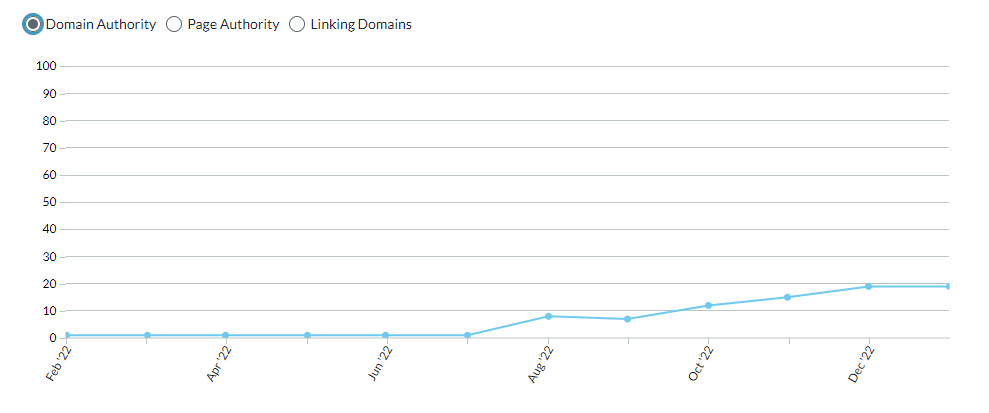
Since this site has been barely referred to, every backlink has a great impact on its DA.
On the other hand, this other site — which is much older and already has a high DA — hasn’t increased that much over a year, despite getting more than 200 built backlinks.
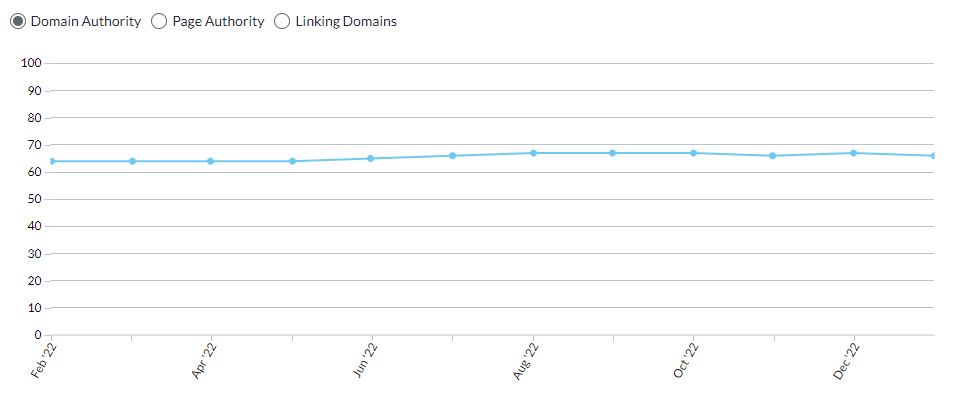
As you can see from these examples, it’s much easier to move the needle the smaller the site. Once it goes beyond 50, it’ll be harder to improve the score. You’ll need more links from highly authoritative referring domains to make a noticeable difference.
While it’s easier to see increases in newer sites, you shouldn’t rely on any just type of backlink. If you’re trying to grow the DA of your site, keep in mind relevancy. It’s important that all links you create come from sites that are topic and market-relevant.
The value of a link is not only its link juice; it can also contribute to brand awareness and referral traffic. And if you choose the wrong sites to link from (for example, a domain related to a country you don’t offer your services in), it could send wrong signals to Google, which could be counterproductive in the future.
How Should Marketers Use Domain Authority in 2025?
Domain Authority is an excellent top-level indicator of the ranking power of a website.
This article has been published on Brafton.com. That’s a website with a Domain Authority of 64.
If I had published the exact same article on my personal blog (I don’t have one, but let’s say it has a Domain Authority of 12), it wouldn’t do so well in Google’s search results.
Which makes sense. Brafton published this post, which gives it credibility that my (imaginary) personal blog doesn’t have.
Using Domain Authority to Find Your True Competition
During a recent appearance on the Search Engine Journal Show (a podcast), Dr. Pete Meyers, prominent marketing scientist at Moz, described Domain Authority as “our attempt to measure the untapped potential of a domain”.
“It’s really a way of benchmarking where you’re at and where you can compete,” he added.
Brafton’s success in search has a lot to do with knowing where to compete.
With our own sites and when we work on SEO strategy for clients, Domain Authority is an important metric for helping us find search results we can realistically break into.
That doesn’t mean Domain Authority predicts rankings.
Take a look at this example.
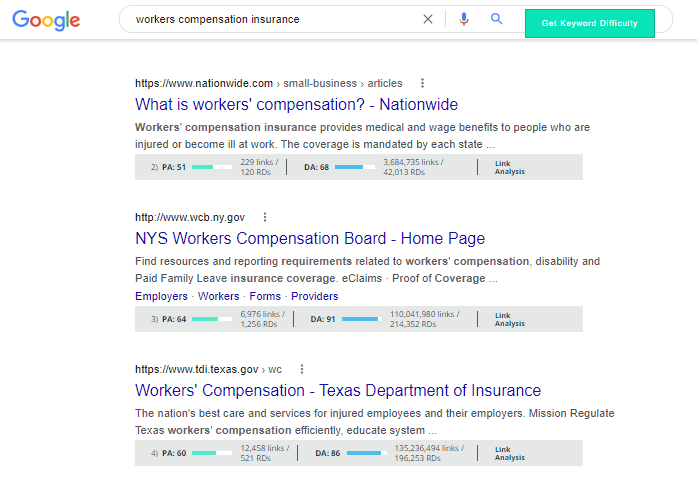
If you have the Moz plugin, you’ll see this a lot. The pages from the sites with the highest Domain Authority don’t necessarily have the best rankings.
The same is true of Page Authority. More on that later.
So, if Brafton.com moves from DA 64 to DA 65, we don’t suddenly outrank all the DA 64 sites for everything.
But a Domain Authority of 64 does give us an idea of the types of sites we should be able to compete against — when various other conditions are in our favor.
If we see a keyword dominated by DA 90 sites, we know getting into the top 10 is going to be very difficult.
Lots of DA 40s and DA 50s in the results, and we can be pretty confident that we’re looking at somewhere we can win traffic with the right content.
Subscribe to
The Content Marketer
Get weekly insights, advice and opinions about all things digital marketing.
Thank you for subscribing to The Content Marketer!
Using Domain Authority to Track Link Building Campaigns
Domain Authority is useful, so of course people have to ruin it.
Artificially boosting Domain Authority is a thing. And there’s plenty of demand for it when it comes to link building.
For example, by manipulating a site’s Domain Authority, the purveyors of dodgy link building schemes can give themselves an air of respectability. So just because you got a link from a DA 60 website, it doesn’t mean that’s a win for your link building strategy.
But if you’re building links the right way — by creating and promoting excellent content — the Domain Authority of your own website is one of the metrics you can use to track your progress.
Of course, ultimately, you build links to get traffic. And you get traffic to get leads. Leads to make sales and so on.
Domain Authority going up is, though, a good leading indicator that your link profile is improving.
It’s also worth noting that Domain Authority is not just about links.
During that same appearance on the SEJ Show last month, Dr. Pete said the latest iteration of the Domain Authority algorithm had started using machine learning to “factor in links that generate traffic”.
The aim was to combat manipulation. Pages have to actually appear in search results to boost a site’s Domain Authority.
Is Domain Authority the Same As Topical Authority?
Marketers love Domain Authority because it’s simple.
Set aside the logarithmic bit and it’s a number between 1 and 100.
Higher is better.
But herein lies one of the bear traps marketers need to watch out for.
And I say that while rubbing the bear-trap-shaped scars around both ankles.
Plenty of marketers have let high Domain Authority go to their heads. Confident that a DA 70 makes them bulletproof, they’re left scratching their heads when their pages fail to rank.
Here’s why:
1. Their Content Isn’t Good Enough
Domain Authority is a decent measure of the health of your link profile.
Links help Google index and rank content. But Google’s algorithm uses hundreds of signals. And it’s getting a lot better at identifying genuinely good content.
That means you can punch above your weight with careful keyword selection and really strong creative work to outrank pages from sites with higher Domain Authority.
But the flip side is also true. You can’t just throw any old rubbish out there and trade off your strong domain. Weak content ranking for valuable keywords will get picked off by your competitors.
2. They Have the Wrong Content
We use a lot of great tools for SEO analysis at Brafton.
But nothing beats eyeballing the search results for yourself.
We always take a close look at the types of content returned in the Google SERP before greenlighting a keyword. There are plenty of good clues there as to what type of content is most likely to perform well.
For example, if you Google your target keyword and see the top positions dominated by comparison websites, you might struggle to break in if you’re not a comparison website.
3. They Don’t Have the Topical Authority
No matter how great your lawyer is, you don’t ask them to perform emergency surgery on you.
They could have the best independent reviews, an amazing track record of success, degrees from the top law schools.
But what do they know about safely removing your appendix? Best you never find out.
Expertise is about depth over breadth.
And while there is no neat and tidy 1 to 100 scale to consult, topical authority in organic search is real.
Here’s an example:
This blog is about content marketing.
Google has indexed 1,600+ Brafton blog articles about SEO, content writing, email automation, PPC, infographics, social media ads, video marketing and other popular content marketing subtopics.
Our blogs rank for 15,000 keywords — a decent chunk of which are pretty clearly content marketing related.
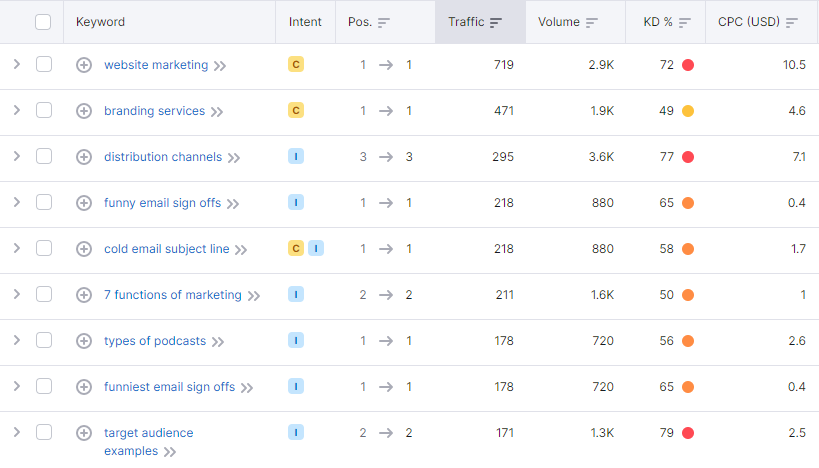
Each post has to be well-written and properly researched. But it gets a natural boost from all those existing articles on similar topics with their search rankings and links from trusted third party sites.
We have strong topical authority on content marketing.
But if we write about rock climbing next week, then we would be trounced in search results by pages from proper rock climbing blogs. Even if those rock climbing blogs had much weaker Domain Authority.
That’s because a good rock climbing blog has strong topical authority on rock climbing. And we don’t.
Can Domain Authority Help With Link Building?
Yes.
But it can’t do it for you.
If a site has a higher Domain Authority than yours then a follow link should be valuable to you.
But if that site has manipulated its Domain Authority then don’t expect that link to lead to better rankings and more traffic.
Just like so many things in marketing, you need to see it with your own eyes.
If a DA 60 site looks like something built by bots to sell links it was probably built by bots to sell links.
Similarly, a site with a low Domain Authority might not be a bad site. It might just be new and / or super niche.
Given the choice, I would rather have a link from a genuinely useful site that had strong topical relevance to my content even if the Domain Authority was low.
Is Domain Authority a Google Ranking Factor?
No.
Domain Authority is a Moz metric.
In fact, Google claims its algorithm is page-based and that there is no such thing as domain-level authority.
People often think Domain Authority is something Google looks at or contributes to in some way because of PageRank.
PageRank was Google’s first algorithm for ranking pages and was entirely link based. If you had the Google Toolbar installed back in the day you could see a version of it (a 1 to 10 scale based on the same data as actual PageRank but only updated 3 or 4 times per year).
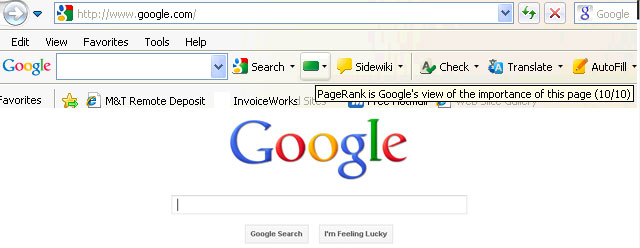
Part of the reason Google stopped publishing PageRank was that website owners and SEOs obsessed over it. It disappeared forever in 2016.
How Can I Improve My Domain Authority?
Domain Authority is still largely driven by inbound links.
So, if you publish more high quality content and earn more links from trusted third party sites your Domain Authority should improve.
But your site doesn’t exist in a vacuum. And Domain Authority is an index.
That means your Domain Authority is impacted by 2 important external factors:
1. What Other Sites Are Doing
Domain Authority is relative, so as other sites gain or lose links that can cause fluctuations in your score, especially at the bottom end of the index.
2. What Moz Is Doing
Domain Authority uses an algorithm that gets tweaked and updated. Changes in how Domain Authority is calculated can mean changes in your site’s Domain Authority.
What Is a Good Domain Authority?
If you Google “content marketing blog,” you’ll see the Content Marketing Institute and HubSpot in the top two positions.
So I suppose 81 (the CMI) or 92 (HubSpot) would be a good Domain Authority for Brafton to aspire toward.
But really Domain Authority is neither good nor bad.
We’ve seen plenty of examples of topical authority trumping higher Domain Authority when it comes to ranking in search.
Domain Authority is also not country-specific.
A site with a very high Domain Authority driven by a predominantly US-based link profile is likely to struggle to outrank websites in France with mostly French links regardless of Domain Authority.
Domain Authority is helpful — “super-useful,” even, as I said in my intro — but it won’t solve all your problems. And if you rely on it too much, you’ll make bad decisions and get poor results.
How Do I Check My Domain Authority?
You don’t need any paid tools to check your Domain Authority.
You can install the Mozbar — a toolbar from Moz — that will show you the Domain Authority (along with some other useful data points, such as Page Authority, number of linking domains and spam score) of any website you visit.

Mozbar shows you this same data under each organic link in Google’s SERPs.
You can also check Domain Authority on the Moz website.
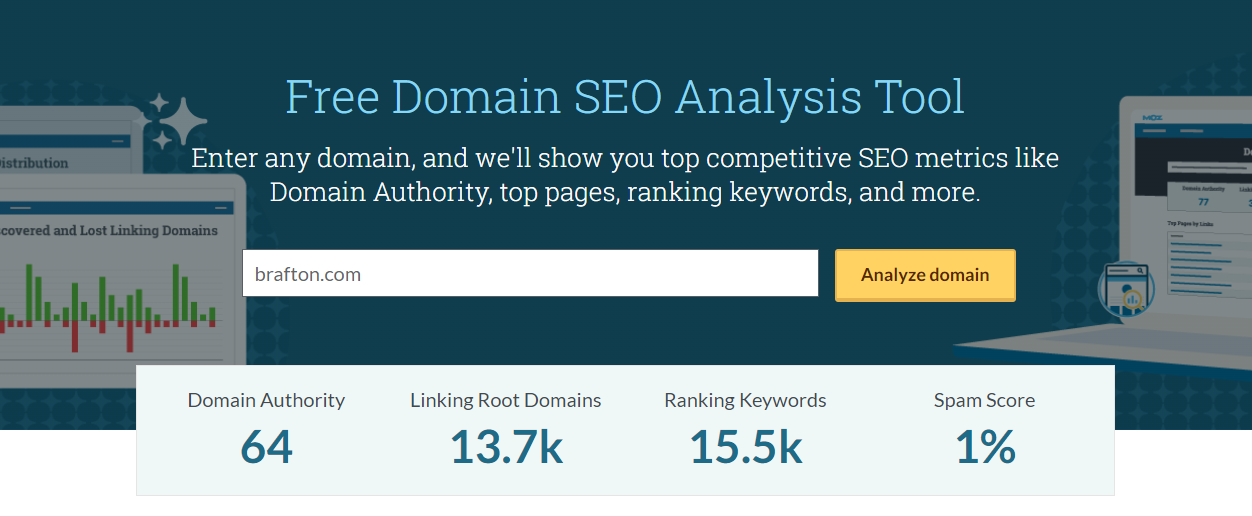
What Is Page Authority?
Page Authority is just Domain Authority at the page level.
So, if Domain Authority tells you the ranking potential of an entire website, Page Authority tells you the ranking potential of an individual URL.
Just like Domain Authority, Page Authority is based primarily on inbound links. But inbound links pointing to the individual URL.
Page Authority is a good way to judge the link profile of a page.
If your content is better, but your Page Authority is lower, then you might need some targeted link building to get your page outranking the competition.
What Are Some Alternatives to Domain Authority?
For a lot of marketers, Moz is probably better known for its content marketing than its SEO software.
Whiteboard Friday remains essential viewing, and some of Brafton’s creative marketing team are contributors to the excellent Moz Blog.
But Moz is not the only show in town when it comes to getting a domain rating for your website.
Other SEO tools have their own algorithms for ranking domains and trying to predict search performance.
Two alternatives that we use — and that often get cited by clients who don’t use Moz — are the Semrush Domain Authority Score and Ahrefs’ Website Authority Checker.
That’s about it for my Domain Authority deep dive.
Hopefully you found it useful. And that it got you thinking about how you’ll use Domain Authority when building links, designing SEO strategies and creating content.
Or maybe it just made you really want to watch Anchorman…





